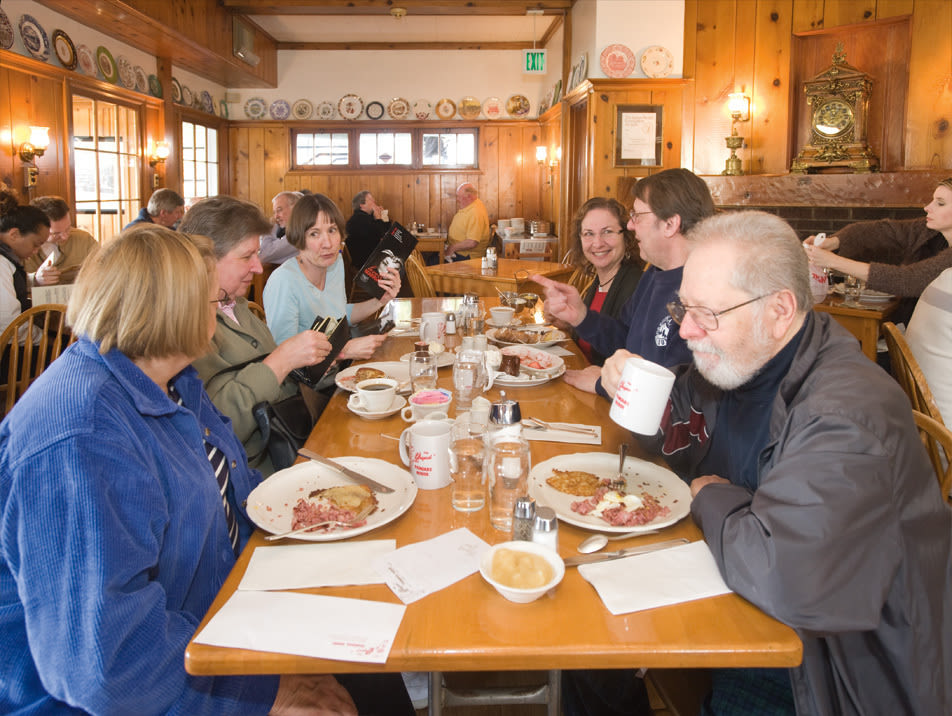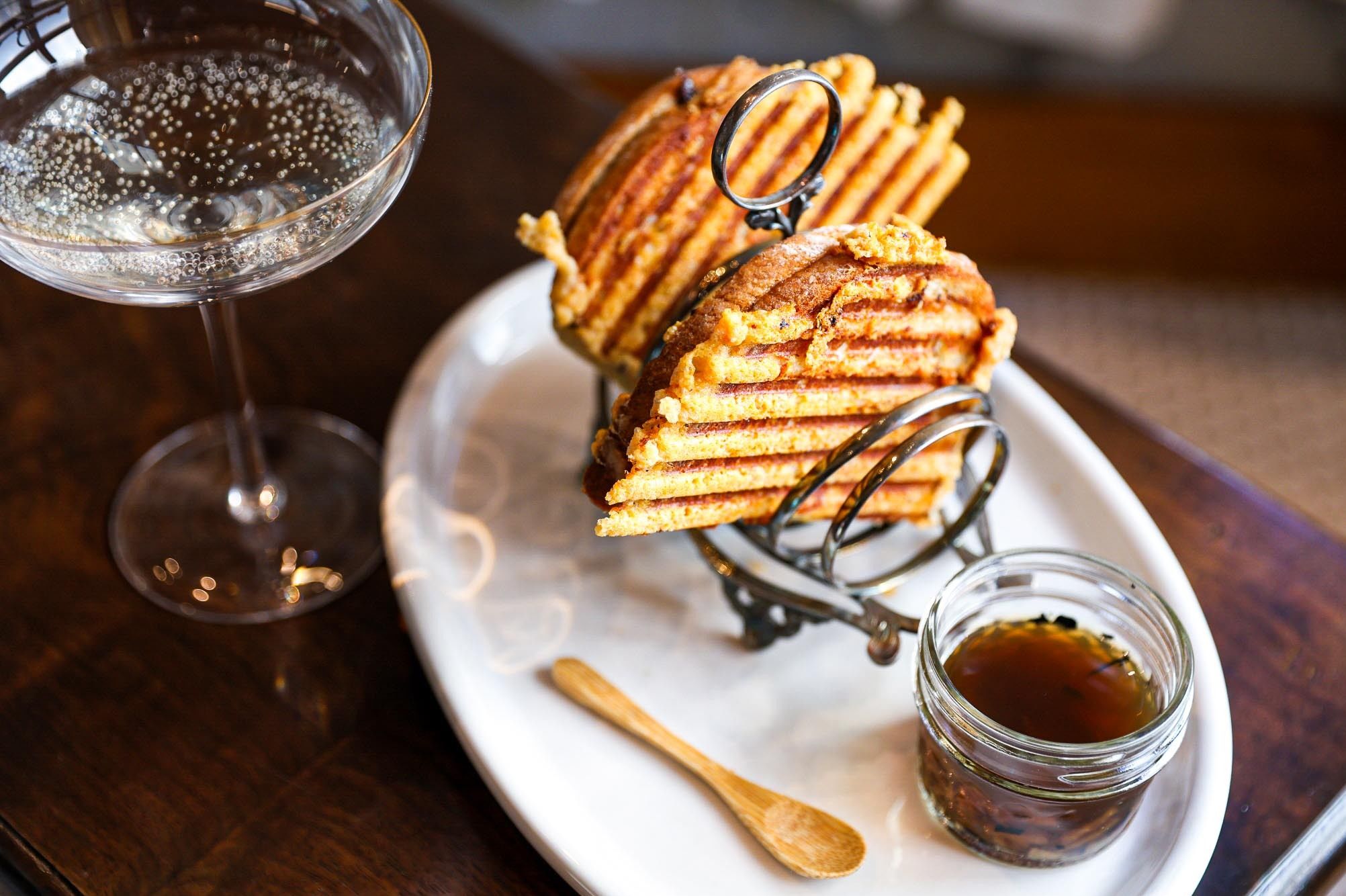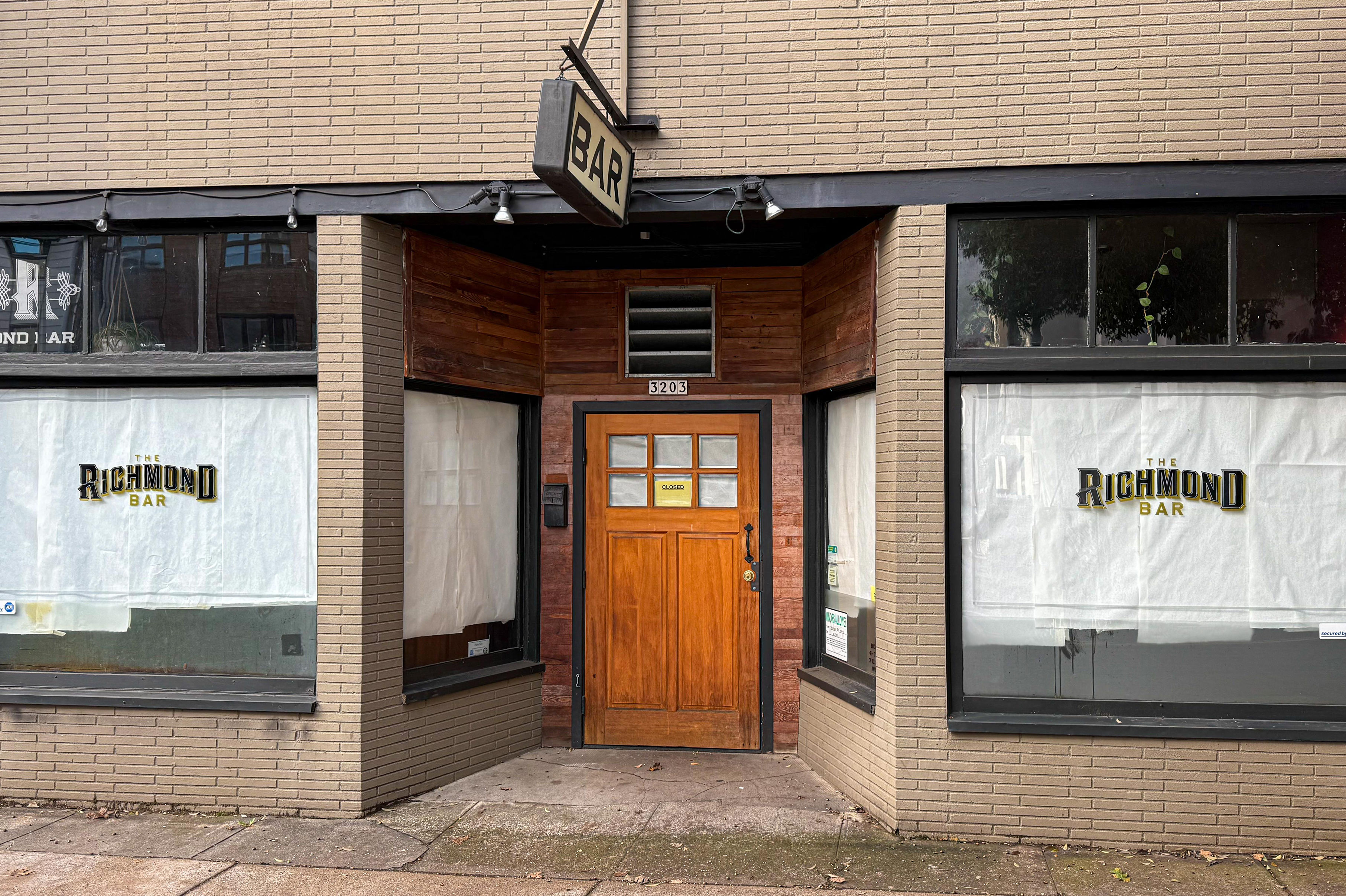The Royal Family of Breakfast
“Now I want to start by telling you something right off the bat,” Ron Highet begins, leaning in from behind a timeworn oak desk to shake my hand. “This is the best breakfast joint in Oregon.”
Though Highet is seventy-six and moves a step slower since his brain surgery, I get the sense he could yank my paw clean off my wrist if he felt the urge. “No, I take that back: it’s the best breakfast joint in the United States. And another thing … ”
Highet has spent thirty-seven years as a fry cook bent over a five-hundred-degree griddle in one of the busiest breakfast kitchens in the city: you don’t clock that kind of time without knowing how to control the tempo, without cleaving straight to the heart of a situation. “Another thing” turns into a dozen things: vivid spurts of history and insight, some topical (“pancakes are a recession-proof business”), some trivial (“we were this close to opening a restaurant in Abu Dhabi”), and others downright fictional (“you realize my wife was once a member of the Swedish secret police”). Restaurant is theater, and in this theater Ron always plays the lead. When he goes off, it’s best to sit back and enjoy the show.
The “best breakfast joint in the United States” opened in June 1953. Right away it was a success. Within the first two weeks customers lined up out the door and along SW Barbur Boulevard to snag a taste of the old-world recipes as delivered by Ron’s dad, Les Highet. Les had a second-grade education and had worked his way up through the restaurant ranks, donning aprons at the grand Davenport Hotel in Spokane and the old Town Tavern at SW Ninth Avenue and Stark Street before scraping up enough money to open the seventy-two-seat Original Pancake House. From the beginning, his philosophy was simple: give people honest, wholesome food made from scratch and they’ll show up in droves. Business soared and, two years later, the first franchise opened in Salem.
In those days business franchising was a relatively new concept, relegated more to automobile manufacturers and quick-service concession stands; but, like any dogged entrepreneur with a vision, Les saw opportunity. Today there are 110 Original Pancake Houses across the country, from Miami to Chicago to Dallas to Honolulu. But the original Original is right here.
“My father figured out how to market the food of middle-class European housewives to a mass audience,” says Ron. “The average person at that time had never seen big, fluffy pancakes with apples and cinnamon—at least not in a restaurant. Our biggest competitor for years was the home kitchen. And we’ve all but won that battle.”
Their secret weapon? Ron’s mother, Doris Highet. A physician with a PhD in biochemistry, Doris devised a way to break down the gluten in the wheat flour used in pancake batter. In doing so, she made a notoriously difficult substance easier to work with. The result: light, airy, pancakes with flavor and body, quite a contrast to the limp, gummy discs that show up on so many breakfast tables. Her precise formulations, along with the original recipes for OPH’s five core batters (German, French, Swedish, buttermilk, and waffle), are locked away in a stack of bound volumes. The only people authorized to view them are the franchise owners and the prep cooks, though there’s been only one prep cook in the last fifteen years, Tito Lopez (whom the Highets call “Super Tito” because he’s an indefatigable, egg-cracking, batter-mixing miracle of nature). When I ask Ron if I can sneak a peek at the recipes, he pretends not to hear me. And anyway, he’s moved on to the next subject: ingredients.
Unlike most restaurant chains, where profit margins outweigh quality, the Original Pancake House cuts no corners when it comes to ingredients. The 6,500 or so eggs the restaurant cracks each week are AA-grade; the cooks use five to make a single omelet. Their famous apple pancake calls for two whole Granny Smith apples (that’s nearly seven hundred apples a week), hand-cut and doused with imported Chinese cinnamon. Same goes for the caliber of the milk, sugar, flour, yeast, bacon, juice, and just about any of the other breakfast essentials it takes to toss out a good, hearty morning meal. What’s more, all the OPH franchises are contractually required to use the same superior ingredients.
“Take our butter,” says Ron. “We use ninety-three score. That’s the best butter you can buy. No restaurant in its right mind would use the quality of butter we use at the volume we do. It’s too expensive. Not only that, we clarify it ourselves, by hand. Do you have any idea what that entails?”
I don’t. Then again, up until a week ago, I had no idea what really good pancakes tasted like, or that the best ones in town came from a chain restaurant a few yards away from the I-5 breakdown lane, in a neighborhood known more for its cheap motels and hooker traffic than for quality gluten. For years, I dismissed pancakes as the great underachievers of the breakfast pantheon, good for sponging up maple syrup, fruit, or whatever booze you might’ve guzzled the night before, but otherwise unworthy of serious attention.
The pancake that flipped me was the Dutch Baby, a hulking concoction of egg, flour, sugar, citrus, and vanilla, baked until it puffs out like a hot air balloon before collapsing into a beautifully golden caldera-shaped pancake. Light and flaky at the edges, rich and custardy in the center, the Dutch Baby is one of the Original Pancake House’s staple dishes. It’s been on the menu since the beginning.
But ordering one isn’t easy. When I showed up hungry at 9:45 on a Sunday morning, the hostess informed me I’d have to wait fifty minutes for a table. Surely she means fifteen, I thought. An hour later, my dish arrived. I was seated at a communal table in between some folks twice my age and two friendly Greek Orthodox priests. I’d only gotten my fork halfway to my plate when a black-robed arm crossed my line of sight, directing my gaze to a whipped, creamy substance. “Butter,” a voice said. “You’re definitely going to want to spread on more of that butter.”
A debate has brewed at the Original Pancake House for years: who exactly is the mayor of the communal table? Some claim it’s Dick, others say Al. Both men have been fixtures at the vaunted eight-top since early in the Eisenhower administration, but no one can say for certain which repeat customer can claim the longest tenure. “We’ve got about a hundred regulars who sit at this table,” says Johnna Lisac, an OPH waitress for the last six years. “Most come in two or three times a week. We know what they’re going to eat, and sometimes we have it ready for them right when they walk through the door. Some customers haven’t seen a menu in years.”

Image: Kim Nguyen
On one late-morning visit, the combined tenure at the communal table stretched past the century mark. Stan Brooks, a regular for at least ten years, finished off his last bites of sourdough toast while pontificating on the table’s mystique. “This is more than just a breakfast table,” he said. “We solve all the world’s problems right here, in one meal. Isn’t that right, Irv?” Irv is in his seventies and has a way of punctuating a point by waving his fork in the air like a conductor’s baton. “Oh, certainly,” he said. “In fact, I’d go so far as to call this the cultural and intellectual center of civilization.”
The Original Pancake House is something of a commercial anomaly in the world of restaurant franchising: it’s a mom-and-pop joint with a national footprint and it’s still owned and operated by the family that started it. Three generations of Highets have mixed batter, sliced apples, fried bacon, brewed coffee, bussed tables, balanced payroll sheets, negotiated franchise deals, and marched screaming-hot Dutch Babies across a jam-packed dining room in the name of the family legacy.
Les and Ron Highet were partners until Les died in 1986. Today Ron, his wife Elinor, their daughters Anne and Elizabeth, and Ron’s son-in-law, Jon Liss, handle much of the daily operations. No outside management consultants or know-nothing MBAs need apply.
Every Wednesday morning, the Highets gather in a large, sparsely furnished room above the restaurant for a staff meeting. They sit in a circle, same spots each week, and discuss everything from which vendors need to be paid to who’s going to pick up the kids. “My sister and I used to play Barbies right over there,” says Ann Highet, pointing to a corner now occupied by a file cabinet. Ann started working in the pantry when she was ten: cutting apples, making orange juice, whipping butter. “Summers were shot. I’d go to the restaurant at 4:30 a.m. with my dad and by the time I got home, I was so greasy and exhausted I didn’t want to go out and play.”
Ann and Elizabeth graduated from Reed College before moving on to law school: Ann at Lewis & Clark College and Elizabeth at Willamette University. They both passed the bar exam on the first try. “Not like someone else I know,” Ann says, nodding toward her husband, Liss. The couple has known each other for almost thirty years, from the time Liss, a New York native, was a Lewis & Clark law student and a regular at OPH’s communal table, where he devoured Dutch Babies and tipped a handsome 25 percent. “I ate here not figuratively every day but literally every day,” he says.
Now the company’s general counsel and corporate chef, Liss works with new franchisees, putting them through a ten-week breakfast boot camp, much of it spent here at the Portland restaurant, clamoring over the same griddle where Ron cut his teeth half a century ago.
“The only way to make it in this business is to focus on the simple day-to-day stuff: making a batter, cooking a pancake, serving it on a nice clean plate,” Liss says. “There’s no room for hoopla, whether it’s Wall Street trends or the latest food fad. It’s breakfast. Don’t overthink it.”




